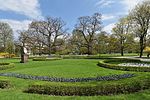Wilhelm Ellis Rau Palace

Wilhelm Ellis Rau Palace (Polish: Pałacyk Wilhelma Ellisa Raua) - a historical building, located by Ujazdów Avenue in Warsaw, Poland.The palace was built between 1866 and 1868 under architect Leandro Marconi's designs. In the nineteen-twenties of the Polish interwar period the palace was rented by the Ministry of Foreign Affairs, serving the function of vice-minister Jan Szembek's residence. The villa burned down in 1944. After World War II, the building was rebuilt between 1948 and 1949, under Polish and Swiss architects, Szymon Syrkus and Hans Schmidt respectably.The palaces houses the Embassy of Switzerland and the Swiss promotional non-profit organisation for Swiss exports, Osec. Next to the building is the location of the Embassy of the United States of America.
Excerpt from the Wikipedia article Wilhelm Ellis Rau Palace (License: CC BY-SA 3.0, Authors, Images).Wilhelm Ellis Rau Palace
Piękna, Warsaw Śródmieście (Warsaw)
Geographical coordinates (GPS) Address Phone number Website Nearby Places Show on map
Geographical coordinates (GPS)
| Latitude | Longitude |
|---|---|
| N 52.223888888889 ° | E 21.023333333333 ° |
Address
Ambasada Szwajcarii
Piękna
00-539 Warsaw, Śródmieście (Warsaw)
Masovian Voivodeship, Poland
Open on Google Maps











